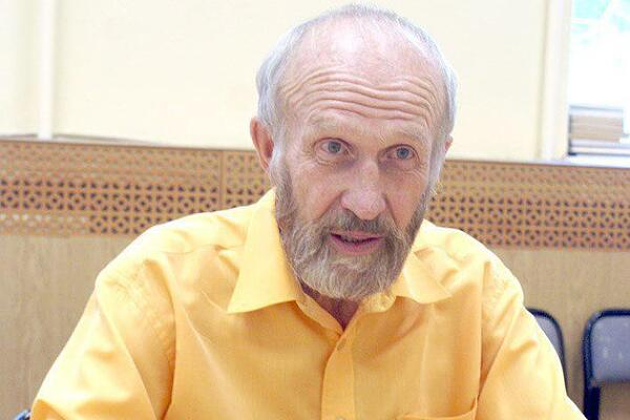This morning, before the opening of the new session of the Udmurtia State Assembly, a man publicly set himself on fire in front of the building in the center of Izhevsk. Crazy? Freak? Doesn’t seem so – it was soon discovered that this man was one of the key figures and ideologists of the modern Udmurt national movement – Albert Razin (pictured above). What caused this respected old man to end his earthly life so painfully? The answer to this question is given by the placard with which he stood, which read: “If tomorrow they forget my language, I am ready to die today.”
A year ago, he was one of the Udmurt scientists who signed an appeal to the Udmurtia State Duma not to support amendments to Russian legislation that would abolish compulsory study of the languages of their titular nations in schools. The text of this appeal can be found here: http://news.uralistica.com/?p=12161. Then, let’s remember, all protests of the national community in the republics were ignored after Putin himself decided that only the Russian language would be compulsory throughout Russia, while all others would be “voluntary”.
We cannot fail to note that suicide is not only a grave sin in Islam and many other religions. Monotheism teaches us that a person should devote his life and death not to the idolatry of the values of this world, but to the worship (in all possible forms) of his Creator, who created him for this purpose and placed him on earth as His vicegerent, measuring out his life.
At the same time, one’s language, culture, and country are natural values for a person, and it is not surprising that for people who do not believe in the One God, His angels, His scriptures, and His messengers, these values can become absolute. And in an age when a huge number of people live only to satisfy the most primitive biological needs or their ego (nafs), this at least evokes greater respect. In this case, this person chose to die painfully as a protest against the extinction of his people and his language in his own nominal republic, where nothing is being done to preserve them.
And however deplorable his act may be from the perspective of faith, it is necessary to understand that the problem to which he paid such a high price is common to almost all indigenous non-Russian peoples of Russia, including Muslims. And if it is not so critical for the peoples of the Caucasus with positive demographic dynamics, it is a matter of life and death for the peoples of the Volga region, whose native languages and demography are melting away.
This terrible tragedy has become a vivid refutation of the false myth that in modern Russia the national languages and cultures of indigenous peoples are not under pressure, but are free to develop and flourish. If this were the case, a person who dedicated his life to the struggle for the preservation of his native culture and language and tried to draw attention to their dire situation by other means would not have resorted to the most extreme.

